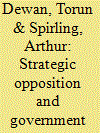| Srl | Item |
| 1 |
ID:
172405


|
|
|
|
|
| Summary/Abstract |
In Westminster parliamentary systems there was once a clear separation between the careers of public servants and of elected politicians. Politicians decided what policies they wanted to pursue, while public servants advised, devised and delivered the policies. This separation ensured that policy ideas were developed by a professional elite with experience and knowledge. Politicians came from a variety of backgrounds, entering politics for a variety of reasons. Over time, the source of policy advice for ministers has shifted from the professional public servant to political advisers lacking experience and with different career ambitions than public service. Increasingly, elected politicians are becoming ‘professionalised’—emerging from similar party and adviser backgrounds. The de‐separation of what were once distinct career paths has led to poorer policy development, increasing public malfeasance, a lower‐quality civil service, and democratic disenchantment. We need to separate the career paths once more.
|
|
|
|
|
|
|
|
|
|
|
|
|
|
|
|
| 2 |
ID:
110533


|
|
|
|
|
| Publication |
2011.
|
| Summary/Abstract |
Cohesive government-versus-opposition voting is a robust empirical regularity in Westminster democracies. Using new data from the modern Scottish Parliament, we show that this pattern cannot be explained by similarity of preferences within or between the government and opposition ranks. We look at differences in the way that parties operate in Westminster and Holyrood, and use roll call records to show that the observed behavior is unlikely to be determined by preferences on any underlying issue dimension. Using a simple variant of the agenda-setting model-in which members of parliament can commit to their voting strategies-we show that the procedural rules for reaching collective decisions in Westminster systems can explain this phenomenon: in the equilibrium, on some bills, members of the opposition vote against the government irrespective of the proposal. Such strategic opposition can reinforce government cohesiveness and have a moderating effect on policy outcomes. We introduce new data from the House of Lords, the Welsh Assembly, and the Northern Ireland Assembly to distinguish our claims from competing accounts of the data.
|
|
|
|
|
|
|
|
|
|
|
|
|
|
|
|